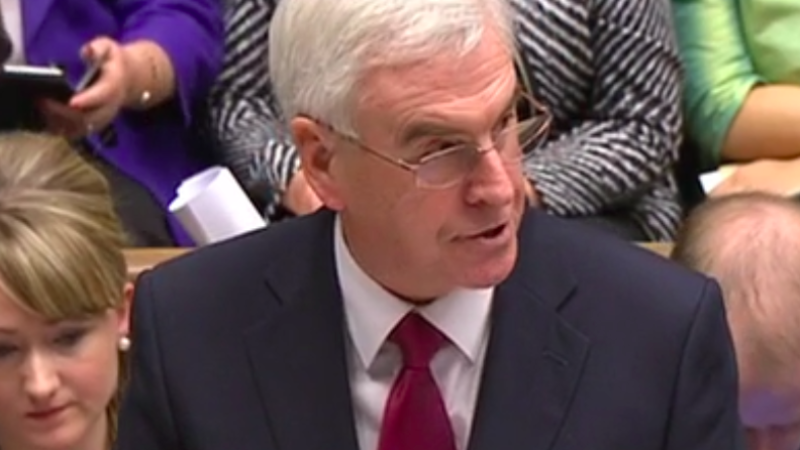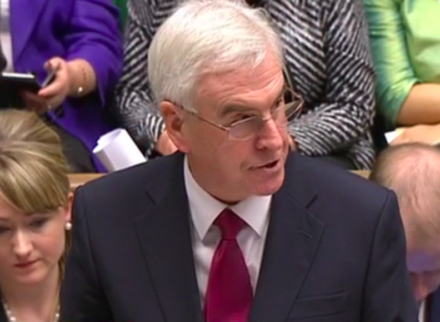

Bemusement, bafflement, despair and laughter. These have been common reactions to the recent antics of our shadow chancellor John McDonnell.
Since the Copeland by-election defeat he has published a self-pitying piece for the Labour Briefing magazine alerting members that a “soft coup” (an obscure phrase normally used by Latin American leaders) was underway against Jeremy Corbyn. For the uninitiated, Labour Briefing is the house journal of McDonnell’s Labour Representation Committee, the leftmost component of the Labour hard left, and its contribution to party unity used to be a column called “Class Traitor of the Month”.
It was founded in 1980 by a Trotskyist group, the Chartist Minority Faction. Leading players on its editorial board include Jackie Walker, who achieved notoriety last year with her allegations about Jewish financing of the slave trade. It is not to be confused with a rival breakaway and bitterly hostile publication also called Labour Briefing, run by Christine Shawcroft, NEC member and ally of Momentum founder Jon Lansman.
After gaining the attention of the media, McDonnell’s spokesperson said his article, penned just days before, no longer reflected his views following the by-election results and that McDonnell intended to focus on party unity.
It has since emerged that McDonnell had repeated the accusations of a “soft coup” – which his spokesperson had sought to disavow, after the result of the Copeland and Stoke by-elections, when he was supposedly meant to be focusing on party unity- in an interview with Socialist Worker, the journal of the Socialist Workers’ Party, boycotted by most of the left.
These antics should not come as a shock. McDonnell has lived his entire political life in an environment where conspiracies, paranoia and a “struggle” against plots (real or imagined) are the norm and are central to how he operates politically.
McDonnell was editor of Labour Herald, a Trotskyist publication seen as a front for the Workers’ Revolutionary Party (WRP) to get a foothold in Labour. It was printed on the WRP’s press and its only paid journalist was a member of the WRP central committee. McDonnell replaced Ken Livingstone as editor after a split in the paper’s editorial board over rate-capping. The WRP split acrimoniously and Labour Herald folded in 1985 when Gerry Healy was ousted as WRP leader over high-profile allegations about his personal behaviour.
For evidence of the obsession with conspiracy theories in these circles where the Labour hard left meets the non-Labour far left it is worth reading Ken Livingstone’s forward to Healy’s biography. Ken claims that “We knew that joint campaigning between genuine Marxists and socialists in the Labour Party was viewed as a dangerous threat by the intelligence services … I have never changed my belief that the split in the WRP during 1985 was the work of MI5 agents.”
McDonnell’s co-editor was Ted Knight, the former Lambeth council leader. Knight’s antics were the source of endless tabloid headlines about loony-left councils, and led to him being banned from holding public office. McDonnell has recently described the Lambeth councillors who refused to set a legal budget – now against Labour Party rules, as well as the law – as “heroes and heroines of their time”.
The vituperative language and tactics used against moderate opponents in hard left publications of that time is very similar to that prevalent on social media today.
In June 1985 in the pages of Labour Briefing, McDonnell practised his rubbishing of previous Labour governments, claiming that Thatcherism was “born out of the despondency brought about by the social democratic governments of Wilson and Callaghan.”
His consistent paranoia about enemies from within the hard left is demonstrated by his extraordinary attacks on Ken Livingstone at the time. Ken had sacked him as chair of finance on the Greater London Council (GLC) because Ken favoured setting a legal budget, which it had sufficient government funding to do, whilst McDonnell blasted Ken as “capitulating to a Thatcherite government”, “breaking ranks with other socialist councils and ducking the fight with the government” (Briefing, April 1985) having previously warned that capitulation over rate-capping could result in the GLC either “being remembered as George Lansbury and Poplar or Marshall Petain and the Vichy government” (Briefing, November 84).
His recent pronouncements should not therefore be seen as an aberration – written according to shadow cabinet member Barry Gardiner when McDonnell was at a “late night typewriter”, but consistent with his life-long approach to politics.
The greatest irony is that despite the recent raging against his parliamentary colleagues and the Murdoch press, McDonnell should look closer to home when it comes to plots to try and oust Corbyn.
He wouldn’t have to look very hard, as Momentum are actively promoting the so-called “McDonnell amendment” rule change (named as such because McDonnell has twice stood for the leadership of the party and twice failed to get sufficient support from fellow MPs to get on the ballot) at Labour’s annual conference which would, if implemented, lower the threshold of support amongst MP and MEPs required to stand for Labour leader from 15 per cent to five per cent.
Unless someone else on the hard left wanted to replace Jeremy, why would Momentum feel the need to aggressively pursue this amendment? Jeremy is the leader of the Labour Party and rules passed at the last annual conference mean that an incumbent leader does not need to obtain nominations from parliamentary colleagues in the face of a leadership challenge.
It would be desirable if McDonnell spent less time worrying about imaginary plots and conspiracies, and more time taking the fight to the Tories and preparing for the Budget, but this is not how he operates, and he is unlikely to change his ways now after over 40 years of obsessive factionalism.




More from LabourList
SPONSORED: ‘Industrial hemp and the challenge of turning Labour’s priorities into practice’
‘A day is a long time in politics, so we need ‘action this day’’
Strong support for child social media ban among Labour members, poll reveals